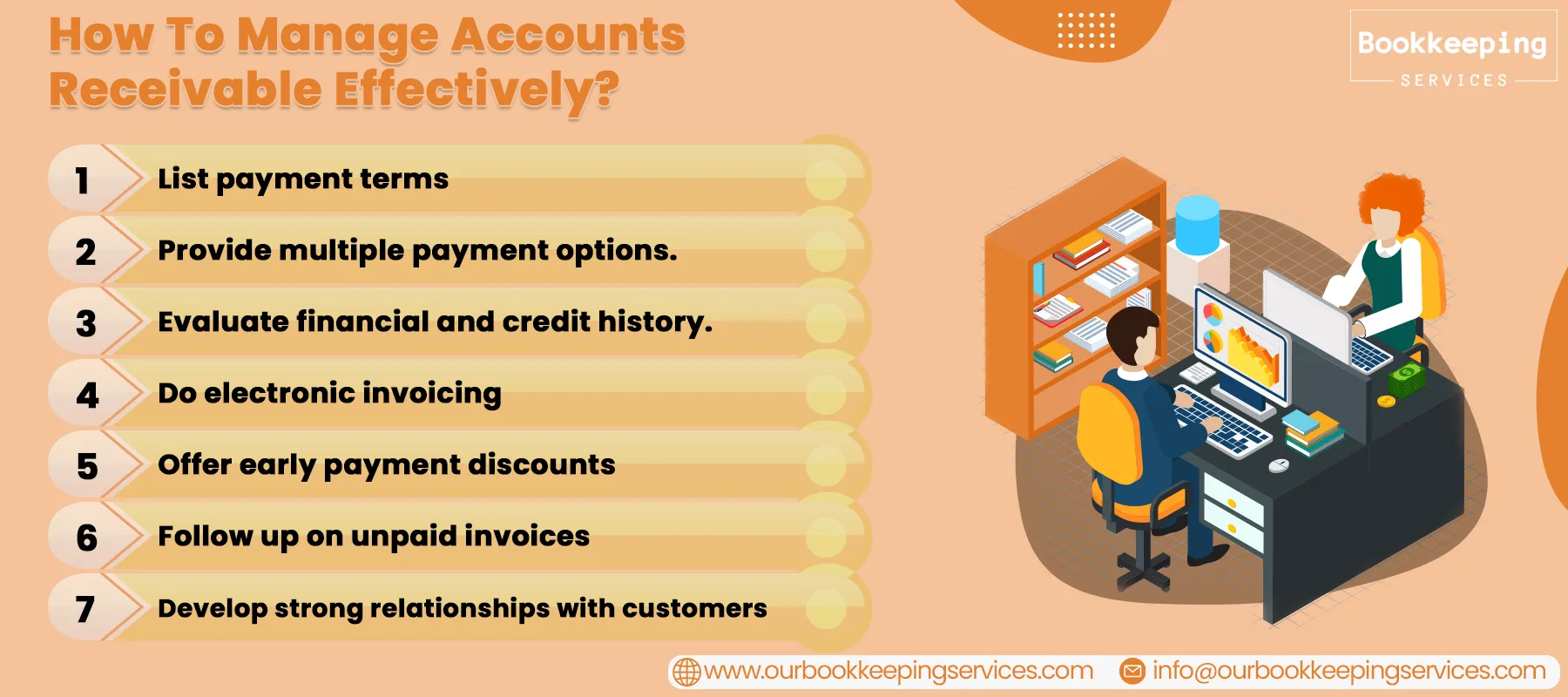
Tips for Managing Your Accounts Receivable
All businesses must have an effective Accounts Receivable Management system to run smoothly. It serves as the company's financial backbone, providing the resources needed to pay personnel, pay for recurring costs, and make investments in expansion potential. It is essential to collect payments on time to maintain a steady and predictable cash flow that can support operations and future growth goals for the company. Any delay or inefficiency can greatly impact the business's financial condition in managing accounts receivable, endangering its long-term viability.
What is Accounts Receivable Management?
The term "Accounts Receivable Management" (ARM) refers to companies' techniques and methods to track and collect payments from their clients or customers. This procedure entails maintaining accurate records of all bills that still need to be paid and taking the appropriate actions to guarantee timely payments. Businesses may also set policies and regulations to discourage late payments. For example, they may discount timely payments or impose penalties for late payments. Proper ARM is essential to maintain a positive cash flow and reduce the danger of unpaid debts, which can negatively impact a company's financial stability.
Why is Accounts Receivable Management Important?
Accounts Receivable management is important because of several reasons:-
1. Positive Cash Flow
The ability to control cash flow is one of the key benefits of accounts receivable management for businesses. The amount of money customers owe to a business is represented by accounts receivable, and prompt payment of bills by clients is essential to efficiently manage this asset. The corporation can guarantee a regular cash stream by doing this, which is essential for preserving a sound financial position.
2. Reduces Bad Debt
Unpaid invoices can develop into bad debts, which can harm a company's financial stability. Identifying clients with a pattern of late payments or payment defaults is easier with AR management. ARM enables organizations to decrease the risk of bad debts by taking remedial action, such as restricting credit to high-risk clients or forwarding past-due bills to a collection agency.
3. Improves Customer Relationships
Stronger customer connections result from efficient handling of accounts receivable since it shows the organization and professionalism of the business. ARM is accomplished by promptly mailing bills and reminders, which raises client satisfaction and fosters client loyalty. Overall, effective AR management may assist companies in building enduring, fruitful connections with their clients.
4. Efficient Financial Reporting
To provide accurate and effective financial reporting accounts receivable management is essential. Accounts receivable management helps a company to generate trustworthy financial reports, spot trends, and make data-driven choices. Furthermore, keeping an eye on accounts receivable will assist in spotting any problems early on and taking the required steps to rectify them before they worsen. You can use Accounting Software to control overall financial operations.
How To Manage Accounts Receivable Effectively?

Accounts Receivable And Payable Management is essential for every company's financial stability since it impacts cash flow and profitability. Here are some tips for managing your accounts receivable effectively:-
1. List payment terms
It's crucial to specify your payment conditions in your service agreement or purchase order in detail to ensure timely payments and avoid misunderstandings. Instead of using ambiguous language like "upon receipt," use specific phrases like "payment due date" to impose a deadline on the customer. To be clear about your expectations, think about writing your terms for payment in a prominent location at the top of each invoice in a bold and readable typeface. You may also ensure that your payment conditions are clear, concise, and easy to comprehend by reviewing a comprehensive dictionary of invoice terminology. You may prevent arguments and guarantee on-time payment of your invoices by being transparent and truthful about your payment expectations.
2. Provide multiple payment options
Having a variety of payment alternatives available to clients can assist in avoiding inconvenience-related payment delays. While some consumers may send a check in the mail to pay, others favor using a credit card or an electronic money transfer. You may accommodate various tastes and make it simpler for clients to pay on time by providing a variety of payment choices. Your customers may have a more pleasant experience, and your billing process may run more smoothly.
3. Evaluate financial and credit history
It's crucial to thoroughly assess a company's financial and credit history before working with them. This may entail looking for unpaid debts and getting feedback from previous business partners. It is preferable to only sign long-term contracts with a business with a history of late payments once its financial troubles have been handled.
4. Do electronic invoicing
With the advancement of technology, sending invoices through digital media has become simpler and more effective for businesses. Businesses may send invoices to customers via email instead of postal mail using online applications. Also, instead of waiting for a monthly billing cycle, deliver bills right once a job is finished. This enables customers to plan for the invoice due date promptly. Several of these applications also have indications that show when the customer has viewed the email, making it harder for them to blame forgetfulness or ignorance for late payments.
5. Offer early payment discounts
Businesses with the resources to give discounts may find it beneficial to offer incentives for timely payment. If a consumer pays within a specified window, such as one week, as opposed to the customary 30 days, they may be given a percentage discount. Nonetheless, it's crucial to make sure that providing these reductions won't have a detrimental effect on the company's profit margins. These reductions also incentivize clients without making payments by the specified deadlines. In the end, receiving any money is preferable to receiving none, even at a lower rate.
6. Follow up on unpaid invoices
To enhance accounts receivable management, consistent and routine follow-up on past-due payments is crucial. Businesses may accomplish this by sending reminders, making phone calls, and, if required, escalating the situation.
7. Develop strong relationships with customers
Strong relationships with your consumers are essential for encouraging on-time payments, fostering loyalty, staying in touch with them frequently, providing top-notch customer service, and is devoted to meeting their needs.
What happens if your Accounts Receivable is not managed properly?
If your Accounts Receivable are not managed properly, there can be several problems or numbers of negative consequences, which include:-
- Cash flow problems
- Increased debt,
- Damage to relationships with customers,
- Increased expenses and
- Reduced creditworthiness
For instance, a company suffered badly due to bad accounts receivable management in recent years in Carillion, a British multinational construction and facilities management company.
Carillion filed for compulsory liquidation in January 2018 after it became clear that the company faced severe financial difficulties. One of the major reasons for the company’s downfall was its poor management of accounts receivable.
Carillion had many outstanding debts owed to it by customers, particularly the UK government and other public sector organizations. However, the company should have collected these debts on time, resulting in significant cash flow problems.
This, in turn, led to a range of other financial problems, including mounting debt, declining profits and a declining share price. Ultimately, the company was unable to sustain its operations and was forced to enter liquidation.
The collapse of Carillion had significant consequences for its employees, suppliers and customers, and the wider UK economy. It also raised questions about the role of accounting practices and financial management in large corporations.
Conclusion
If you want help managing your accounts receivable, contact Our Bookkeeping Services. We help small businesses succeed by offering expertise and guidance. We advise how businesses may use accounts receivable to increase their income and meet or exceed their goals. We also offer services like payroll management, monthly financial reports, account reconciliation and dedicated accounting services.